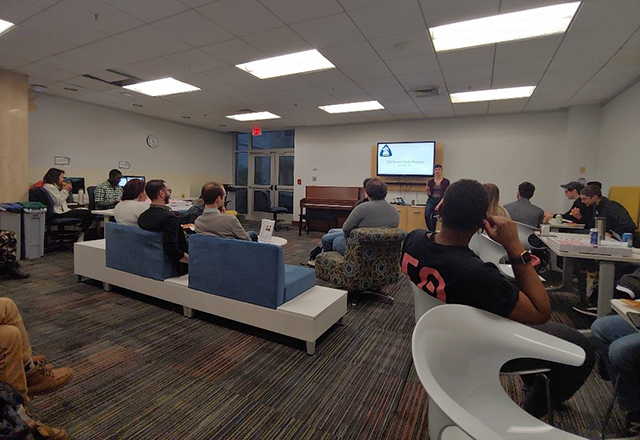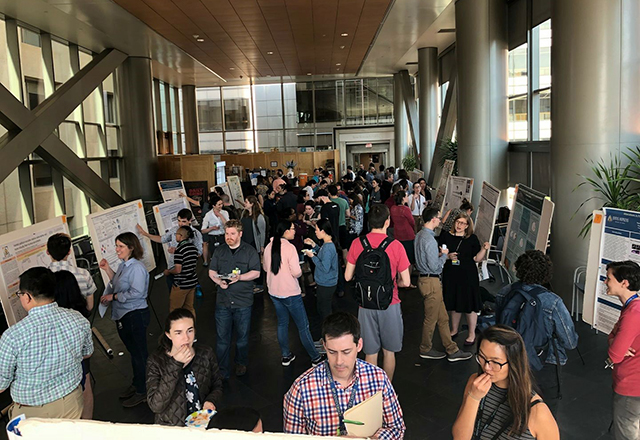It is a truth universally acknowledged, that a graduate student in possession of a stipend must be in want of free food. It is this fact that the Graduate Student Association (GSA) uses to draw students to their multitude of events. However, most graduate students only know two things about the GSA: 1. They send a lot of emails 2. They host social events for graduate students. However, once you are drawn in by their lure of free food, you can quickly discover that there is far more to the GSA than you may expect. I sat down with the past three GSA presidents — Kaitlin Wood (2019–2020), Kyle Cavagnini (2018–2019) and Ashley Cook (2017–2018) — to get their perspectives on the GSA.
What is the GSA?
The GSA council is made up of an executive board elected each year by graduate students as well as a student representative from every department and program at the school of medicine. When I asked Ashley to describe the role the GSA plays on the school of medicine campus, she said, “I always think of the GSA as a two-pronged approach. One, it is a cohesive voice for the graduate student body, which is a mechanism for students to have their voices heard, and lets them contribute to the way policies are set at the school level. On the other side it is also a social structure, and a space for students to engage with each other.”
What does the GSA do?
The social aspects of the GSA are widely known, but the GSA goes far beyond free beer when it comes to helping students. In particular, the GSA plays an enormous role directing policy change on campus, and their most important tool for promoting student needs is the annual GSA survey. According to Ashley, “Something really special about the survey is that it’s not just the GSA driving topics. There are quite a few open responses, and the people who analyze the survey truly go through every response.” Kyle added, “Every year the new executive board sits down and goes through the survey data, and from that comes up with their list of action items to address the needs of the students.” One way these action items are taken out to the university is through student representatives who participate in a variety of universitywide committees ranging from the Institute for Excellence in Education Board (IEE) to the faculty senate. One point that Kyle wanted to emphasize was that “Yes, the GSA has standing positions on the university committees, but I think that as an organization we are recognized as one of the most effective student governments in the Hopkins system. Because of that, you see our people being invited to sit on these universitywide boards as the only graduate student representative. Our people are recognized for their professionalism and dedication, and it shows in where we are invited to be.”
To ensure project continuity and seamless transitions between leadership, anyone elected president serves a two-year term: first as president-elect and then as president. Kaitlin explained the benefit of this arrangement: “Having the president and the president-elect structure and having annual action items ensures things don’t drop off the radar. One thing that we see with students and their troubles is that these problems are persistent, but the institutional memory can be short for graduate students. We’re here as a mechanism to keep pushing on things that matter to graduate students.”
What are some concrete changes the GSA has made on campus in recent years?
Most recently, the GSA had its first Wellness Week at the end of January. One takeaway from the 2019 GSA survey was that students wanted more events like GSA week. This wellness week was full of events including a guided meditation session, a self-defense class, a budgeting workshop and much more. Kaitlin shared that, “Getting GSA Wellness Week up and going was a big pull this year, and I was really happy to collaborate with partners over at the school of public health.” One action item the executive board wanted to emphasize this year was working to destigmatize acts and interests around mental health and wellness, and to make sure that student resources in that area are more accessible. Wellness Week was a great way to address both the survey results and this action item. In addition, two things the GSA organized at orientation this year to promote student mental health and well-being were to have the Office of Institutional Equity (OIE) — an office that addresses discrimination and harassment on campus — present, and Kyle shared his experiences using University Health Services (UHS) mental health. Thanks to the GSA, we even have the new satellite OIE office on the East Baltimore campus. In Kyle’s term as president, one goal was to make the reporting mechanisms to OIE more easily accessible to students, and by the end of the year that turned into physical space on campus.
Finally, the GSA survey is one of the big factors that got the ball rolling on addressing learner mistreatment on campus, a topic that Kyle is very passionate about. Sharing some of the new policies, he said, “We have mandatory mentor training for all faculty who have students in their lab. We also have an assessment that is unique to Hopkins biomedical sciences to monitor best practices in mentoring in terms of support for scientific development, career development and personal treatment. This is something that has not been done in the biomedical sciences before.” These are all huge gains for graduate students and are the result of a committed effort spanning years to address learner mistreatment on campus. Have you picked up on the theme yet? The GSA survey was the driving force behind all these amazing changes on campus and, of course, the dedicated students working on the GSA council.
What can I do to be more involved with the GSA?
First, attend one of the GSA meetings/happy hours. These are held the second Wednesday of every month from 5–6 p.m. The meetings open with an invited speaker, and then the executive board gives updates on the various activities or policies they’re working on. The GSA also provides dinner and free drinks during the meeting, including soda, beer and ciders. It’s a win-win: Get more informed about what’s happening on campus, and get some free food in the meantime. Second, complete the GSA survey when it comes out this spring! It is the most important way you can make sure your voice is heard. The list of ways to become more involved could be endless, but these are two of the best ways to get started.

Related Links
- GSA website: gsa.jhmi.edu/
- GSA Facebook group: facebook.com/JHopkinsMedicineGSA/
- GSA Instagram account: instagram.com/jhmi.gsa/
- Office of Institutional Equity (OIE): oie.jhu.edu/
- Dome article on learner mistreatment: https://www.hopkinsmedicine.org/news/articles/johns-hopkins-takes-action-against-bullying-and-harassment
Related content
- The State of the Union: US Graduate Student Employee Rights in 2019
- The Future of Biomedical Education: A Conversation with Dr. Ziegelstein
- International Students Offer Unique Perspectives on Graduate School
Want to read more from the Johns Hopkins School of Medicine? Subscribe to the Biomedical Odyssey blog and receive new posts directly in your inbox.
